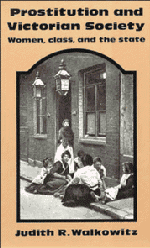Book contents
- Frontmatter
- Contents
- Preface
- Introduction: The Revolt of the Women
- Part I Prostitution, Social Science, and Venereal Disease
- Part II The Contagious Diseases Acts, Regulationists, and Repealers
- Part III Two Case Studies: Plymouth and Southampton Under the Contagious Diseases Acts
- 8 Plymouth and Southampton Under the Contagious Diseases Acts
- 9 The Repeal Campaign in Plymouth and Southampton, 1870–4
- 10 The Making of an Outcast Group: Prostitutes and Working Women in Plymouth and Southampton
- 11 The Hospitals
- 12 The Local Repeal Campaign, 1874–86
- Epilog
- Notes
- Selected Bibliography
- Index
- Frontmatter
- Contents
- Preface
- Introduction: The Revolt of the Women
- Part I Prostitution, Social Science, and Venereal Disease
- Part II The Contagious Diseases Acts, Regulationists, and Repealers
- Part III Two Case Studies: Plymouth and Southampton Under the Contagious Diseases Acts
- 8 Plymouth and Southampton Under the Contagious Diseases Acts
- 9 The Repeal Campaign in Plymouth and Southampton, 1870–4
- 10 The Making of an Outcast Group: Prostitutes and Working Women in Plymouth and Southampton
- 11 The Hospitals
- 12 The Local Repeal Campaign, 1874–86
- Epilog
- Notes
- Selected Bibliography
- Index
Summary
On January 1, 1873, Julia Clark, a lock-ward patient at the Royal Portsmouth Hospital, complained “of the quality of the soup and potatoes given [inmates] for their dinner” and began to throw the plates and tableware about. The resident matron admitted that the soup was watery and managed to quiet the room. The next day, further disturbances broke out in the same ward, and three women were locked in dark cells. That night, the rioting erupted anew; when it had ended two days later, the police had arrested seven women and eight others had been locked in confinement cells.
Five days after the commencement of the “soup” riot, Inspector Sloggett arrived at the hospital to investigate. He carefully interviewed each refractory patient “first alone, in her place of confinement, to hear her complaints” and “to take measures for her immediate release.” He found Julia Clark sitting on a bed in a small room without light, with an untouched pile of bread and butter next to her. She had been in the room for five days, and Sloggett now described her as “contrite and submissive.” She insisted that she had no complaints, except in reference to the soup and potatoes, although she was visibly disappointed at not receiving her discharge.
Sloggett then visited two other women in confinement cells. Laura Lewis, who had protested because a letter she was expecting had been withheld, had been in the “dark” room for three consecutive days.
- Type
- Chapter
- Information
- Prostitution and Victorian SocietyWomen, Class, and the State, pp. 214 - 232Publisher: Cambridge University PressPrint publication year: 1980



